- Home
- Raymond Benson
In the Hush of the Night Page 2
In the Hush of the Night Read online
Page 2
“Thanks.” They exchanged cell numbers and her inbox on the computer dinged. An email from harris.caruthers, with the subject line, Bear Claws. “Looks like I got your message. Okay, see you tomorrow. Thanks for calling.”
“You bet. Have a good evening.”
Annie sat back at her desk. She opened the attachments and found typically lacking crime scene reports by the local police chief and a captain, as well as photographs and autopsy results.
No, she wouldn’t be leaving the office just yet, even though it had been a long day in her cubicle. Annie had spent it reading analyst reports, going over new case files, and catching up on bureaucratic paperwork. She was way behind and grateful for what had been two whole days of relative quiet on the tenth floor. That was rare. Most of her time was spent at any number of locations in and around Chicago, interviewing victims and suspects and interacting with the not-for-profits.
The tattoo had become something of a fixation for Annie. After studying two previous trafficking/murder cases—one in Minneapolis and one in Chicago—she was convinced there was a large white slavery network operating between the United States and Russia. The victims in those two cases—and possibly this new one—had been subjected to trafficking violations prior to being murdered. Each one bore the tattoo of a bear’s paw, claws outstretched, on the neck behind the right ear.
The Minneapolis case had occurred in 2009, the year Annie first became interested in the FBI as a career choice. She’d been twenty-four, having just received her MS in forensic psychology, and she simply applied. The acceptance came as a surprise, and then it all became a whirlwind of activity—five months of training that fall at Quantico, and then moving to New York from her Chicago home to work as an intelligence analyst in Manhattan. In 2014, she was granted the request to transfer back to Chicago, where she was promoted to Special Agent.
One of her first assignments that year after joining the Civil Rights Unit was the investigation of a different human trafficking incident—also a murder—in the western suburbs. While working the case, Annie discovered similarities to the 2009 murder. Besides sharing the same tattoo, both victims were illegal Russian immigrants in their early twenties. While the 2009 woman’s body was found in a hotel room in Minneapolis, the 2014 corpse was discovered in a dumpster on the Chicago south side. Neither case was solved. The 2014 case was such a disturbing crime that from then on, Annie kept an eye out for information regarding the “tattooed girls.”
The Michigan accident scene reports outlined what Chief Bill Daniel and Captain Mike Baines gleaned from the evidence at hand. The collision was just as Caruthers described. The woman had been locked in the trunk of the Sebring. The autopsy showed that she had been restrained, beaten, and raped prior to her death. Obviously, the driver, who was drunk, had been transporting her from one crime scene to possibly another. The sedan’s registration was bogus. It was in a name other than the driver’s and, according to Agent Caruthers, didn’t exist.
Annie transferred the files to a flash drive and shut down her computer. She would study the rest of the material at home over the leftovers of a Chinese take-out meal she’d had the night before and a glass of red wine. Her original plan of stopping for a half hour at the studio to practice the latest tap routines went out the window. So much for her misguided idea to take a dance class in her spare time!
She drove the Bureau car—the Bucar—a blue 2008 Ford Fusion, out of Chicago’s FBI field office lot on Roosevelt and headed north on Damen. The expressway on an early Friday evening was going to be madness, so Annie took the alternate route she preferred during rush hour to get home. It was a diagonal northeast slice across the near west side via Ogden and Larrabee Streets. She lowered the driver’s side window and allowed the breeze to ventilate the hot car as she turned on the A/C. At a stop light, she undid her ponytail and let her shoulder-length brown hair fall freely. In the rearview mirror, she noted that her dark Italian eyes were bloodshot from a full day of staring at a computer monitor.
Ugh. I need that glass of wine. But if I’m going to study a case file, I might need a tad bit of CAFFEINE.
At Fullerton, she headed east toward Lincoln Park and the assigned lot for her building, the oddly named Cakewell Apartments on West Fullerton Parkway. Although the complex was populated by what seemed to be a large assortment of much younger adults—well, younger than her thirty-one years, anyway—Annie liked the location and the price. It had been the first choice on the realtor’s list when she was transferred back to Chicago. Her salary as a Special Agent allowed her to just barely afford the rent in such a trendy area, so why not? If she was going to do potentially dangerous work, she deserved to enjoy where she lived. Jogs through the park to the shore of Lake Michigan were welcome diversions and tension-releasers. Former Broadway hoofer Derek McGrath’s dance studio, where she attempted to take a weekly tap class, was two blocks away. The nightlife around her home was vibrant, and there were plenty of outstanding restaurants. Its access to public transportation was good, too. When she didn’t want to use either the company car or her personal one, a 2011 Honda Civic, the Red and Brown lines of the El were just a stone’s throw away at Clark and Fullerton. Most anything she needed was within walking distance except a grocery store. For that, she had to drive.
And there was a Starbucks on the corner across the street from the parking lot.
As she entered the coffee shop, she heard a familiar voice from one of the tables. “Oh, hey, Annie.”
She turned and smiled. It was a familiar sight—him sitting with his laptop and a cup of java.
“Hi, how are you, Jason?”
They often ran into each other; he lived in a building nearby with the help of a trust fund that a grandparent had left him. Although Jason Ward was a student five or six years younger than she, they had become friendly since she moved into the neighborhood. Frequent sightings on the street—and especially in Starbucks—had developed into a sociable relationship. Jason was the type of guy who exuded intelligence and sensitivity, which, to Annie, was counter to the macho Italian wannabe tough guys so prevalent in her adolescence. He wanted to be a writer and had already completed one novel, which was still unsold.
“Great,” said Jason. “And you? Long day fighting bad guys?”
She laughed. “Long day, yes. Fighting bad guys, not today. Just paperwork.” She ordered a beverage (half decaf—she didn’t want to be up all night) and stood in front of his table as she sipped the hot drink.
“Well, that doesn’t sound like fun,” he said. “Actually, paperwork is probably the only thing I could do at the FBI. You ready for the long weekend at least?”
“Are you kidding? I have to work tomorrow. After that—we’ll see.”
“Ugh, sorry.”
“So I haven’t seen you recently—did you graduate?”
“I did. Master of Arts. Now I can look forward to the rest of my life with a totally useless degree.” He nodded at the laptop. “And write my book.”
“That’s terrific, Jason. Congratulations. And it’s not useless.”
He rolled his eyes. “Thanks. I hope you’re right.”
“What do you have planned for the weekend?”
“Nat’s parents are throwing a big graduation party for us tomorrow up in Highland Park. She got her master’s in psychology.”
“Oh yeah? My bachelor’s is in psychology. Are you still looking at a fall wedding?”
“Yep. Next October.”
“Well, congratulations on both. Am I ever going to meet your fiancée?” Annie wondered what Nat was like. With his dark hair, blue eyes, trim build, and a nice smile, Jason was good-looking—and sharp as well.
“You haven’t met? I’m sorry. She’s over at my place a lot, I figured you’d seen each other.”
“Well, I do live in a different building, and it also seems like I’m never home. Listen, you can’t marry her unless she meets my approval, you know.”
Jason said, “Whoa, that’s a lot o
f pressure. I’ll get her to make an appointment.”
“You do that. Okay, I have to run. Have a good evening.”
“See ya later, Annie.”
She walked the half-block to her building, grabbed her mail from the box in the lobby, and rode the elevator to the third floor. As she unlocked her door and turned on the lights of her one-bedroom apartment, Annie grinned at herself. She could tell he found her attractive. There was always a hint of flirtation between them, despite their five- or six-year difference. It was flattering, in a way.
“Forget it, Annie,” she said aloud. “He’s taken already, and he’s too young for you.” She locked the door behind her, the cue for Aloysius to wander in from his kingly spot on the bed in the other room and meow a greeting. “Hello, and you’re too young for me, too. Are you really fourteen now?”
The cat meowed again.
“Okay, dinner’s coming up in a sec.”
Before kicking off her wedge heels, Annie performed a quick succession of tap moves, reciting them in her head—
Right paradiddle, Left paradiddle
Right para para, Right paradiddle
Left paradiddle, Right paradiddle
Left para para, Left paradiddle
—and then she put down her coffee, purse, and keys and went through the night’s tasks. First, feed the cat. Second, take the leftovers from the fridge and start them in the microwave. Third, remove the Glock 27 and take off her ankle holster. Fourth, turn on the iPad that still pumped music through two speakers she’d had since college. The choice? Bonnie Raitt. Nick of Time. Her mother had been a huge fan of ’70s, ’80s, and ’90s female singer-songwriter artists, and the appreciation had soaked into Annie’s blood by osmosis. Fifth, get out of the business attire and put on a robe. She could study the case files while she ate, and, a little later, in bed. She figured she’d have to get an early start in the morning.
As she poured dry food into Aloysius’s bowl and set it on the floor, Annie reflected on the last six months without Eric. It had been difficult in the beginning, but now she was used to flying solo. She didn’t miss him anymore. Weekends alone weren’t so bad.
Which was why, she supposed, she delighted in occasionally and inadvertently flirting with younger guys who lived nearby. She told herself it was harmless. And therapeutic.
As she went to the bedroom to undress, she forgot all about both Eric and Jason. She had a case file to study.
3
Jason Ward had been to his fiancée’s family home on Lyster Road in the Chicago suburb Highland Park several times, and it never failed to fill him with awe. It wasn’t among the fanciest houses on the affluent North Shore by any means, but it was still a mansion by his standards. The English Tudor-style structure was less than ten years old, and it sat on an acre of land not far from Lake Michigan. It had at least 7,000 square feet of living space on the first and second floors, and the classic two-story foyer was dominated by a grand, sweeping staircase. A basement level held an additional 3,000 square feet, plus a gym, home theater, wine cellar, and a bar. The Paleys had more bedrooms than they needed. The pool, bar, and expansive lawn in the back were a bonus.
The imported wool business must really be swell.
Jason only knew a mere 10 percent of the attendees at the graduation party—and they were all fellow students from Roosevelt. The event had begun at 11 a.m. and would last until 5. Outdoor grilling, swimming, volleyball, and heavy drinking would be the main attractions for the next six hours or so.
Natalia was dressed in a breezy summer dress with a bikini underneath for quick-change aquatics. She looked marvelous, as usual.
Note to self: pinch yourself again.
That he could land such a beautiful, brainy woman—and a wealthy one at that—was nothing short of a miracle. She was the same age as he, medium height, blonde, and into literature. That’s what he had really found attractive. She liked to read, and to a writer, that meant a lot.
Nat already had a job lined up in Chicago at a mental health facility. Jason, on the other hand, was hoping to finish his second unpublished novel, and perhaps substitute-teach to help make ends meet. Nat had temporarily moved back in with her parents for the summer, and after the wedding she and Jason would live together in his apartment in the city. That was another thing, too—Nat didn’t care what her family may have thought about her intentions to “live like a Bohemian.”
They were out by the pool where Trey, Nat’s brother, was about to throw burgers and hot dogs on a grill the size of a ping pong table.
Nat held out an empty glass. “Honey, could you go inside and bring me a refresher? The sangria is in the fridge. You might as well bring out the pitcher.”
Jason took the glass. “You lush, it’s not even noon yet!”
“Hey, I’m celebrating my graduation. You should, too, Mr. I-love-mimosas-on-Sunday-mornings.”
“I’m kidding, Nat.” He shrugged. “I’m going to pace myself since it’s so early.”
Trey had overheard. “Oh, woopsy-doo, Mr. Artiste,” he said. “Or should I say Mr. Wuss …” In a high-pitched voice and with prissy gestures, Trey whined, “I’m going to pace myself since it’s so early; I don’t want to get shit-faced before noon.”
Trey’s friend Mack, who was often joined to his buddy at the hip, guffawed. He handed Trey the meat for the grill in an assembly-line fashion.
“Hush, Trey,” Nat said. “Pay no attention to my jerky brother, Jason.”
“It’s okay, Nat,” Jason replied, getting up off the lawn chair. “Trey’s a war hero. He can say whatever he wants, can’t he?”
“Damn right, I can.”
Jason stepped up to Trey. “And just so you know, I got over letting playground taunts bother me when I was in third grade.” He walked away, crossing the patio and into the house as Trey and Mack glared at him.
Jason didn’t like his future brother-in-law. The guy had a big mouth and was something of a bully. Trey Paley never had anything nice to say. He was also a bit of a weird character. Today, Trey was dressed in an odd hybrid of summer beach wear and army fatigue cut-offs. Older than Nat by two years, Trey had spent some time in the army. He had the kind of he-man physique Jason could never imagine displaying, as well as several tattoos. Jason wasn’t impressed by the ink; he had always found too many tattoos a little distasteful, even though Nat had one on her left ankle.
Yeah, I’m a wuss, but at least I can diagram a sentence.
Mack was strange, too. He was from Russia or Ukraine, something like that. Never said much, just grinned at everything Trey blurted out. He was older, probably thirty or so, and was just as buff and illustrated as Trey, with bright blue eyes. Girls liked Mack even though he was short—only five and a half feet tall. His bulk made up for stature.
Angela Paley, Nat’s mother, was in the kitchen with a couple of servants she had hired for the day. They were busy preparing a gigantic salad and other side dishes, such as stuffed mushrooms, roasted root vegetables with curry and cilantro, and “pigs in a blanket” for those who didn’t want to go too chichi.
“Hello, Jason, how is it out there? Hot?” she asked.
“Not too bad.” He found the pitcher in the fridge. “Nat wants the sangria.”
“When are your parents arriving?”
“They said they’d be here by noon. Dad’s assistant manager wasn’t able to take over for him, so they had to be open for a little while this morning and close early.”
“Oh, I’m sorry to hear that. They’re closing early just to come to the party?”
“That’s right.”
Jason couldn’t tell what Mrs. Paley’s reaction was to that. Impressed? Surprised? It was no secret the woman had qualms about her daughter marrying a guy who wanted to be a writer. Not only that, his family ran an independent hardware store and was most certainly in a tax bracket far below that of the Paleys. Nevertheless, Jason liked her. While both of Nat’s parents were striking, his fiancée mostly got her good looks fro
m her mom. Angela Paley had a popular blog covering high society news and events in the Chicago area. Jason thought it was actually well written and sometimes humorous. He believed that although Nat’s mother may have been concerned about his choice of career and financial prospects, she liked him, too. He preferred to think she did so because he wanted to be a writer; after all, she was one, too.
In fact, Nat had let slip that Mrs. Paley had once even posed nude in a men’s magazine in the early eighties. He was not to mention it to anyone. A trophy wife for Mr. Paley, perhaps?
He took the sangria back outside to the patio, where Nat was now helping one of the servants with the buns and condiments.
“Jason!”
It was Nat’s father at the back door.
“Hi, Mr. Paley.”
“What did I tell you before? You’re supposed to call me Greg.”
“Sorry, it’s a habit to always address my future fathers-in-law that way.”
“Well, stop it. I think your parents are here.”
Jason followed his future father-in-law back inside and through the house to the foyer. Greg Paley was a tall, formidable guy who might have frightened Jason a great deal if he’d had the personality of his son Trey. Instead, he was one of the nicest fathers-of-girlfriends Jason had ever met. Fifty-eight or so, the man was in excellent health. He, too, had been in the military when he was younger. The shock of white hair over rugged, Slavic features made him strikingly handsome. His grandparents had apparently somehow managed to emigrate from the newly formed Soviet Union back in the 1920s, which placed Nat in the third generation of her Russian American family.
“I’m looking forward to seeing them again,” Greg said, gently slapping Jason on the back. “Oh—here they are!”
Charlie and Tricia Ward, along with Jason’s older sister, Miranda, were just coming through the large double front door, held open by Dudley, the Paleys’ butler.
“Hey Mom, hey Dad, hey Sis,” Jason said, giving them hugs all around. “You remember Mr. Paley?” He gestured back to the host, who had his hand out.

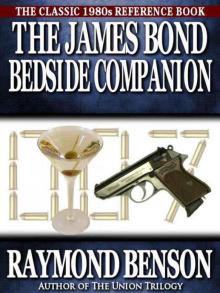 The James Bond Bedside Companion
The James Bond Bedside Companion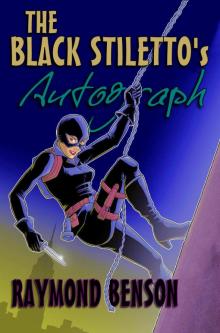 The Black Stiletto's Autograph
The Black Stiletto's Autograph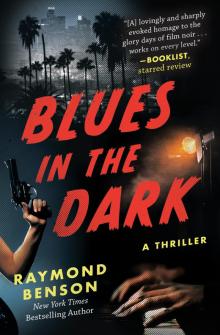 Blues in the Dark
Blues in the Dark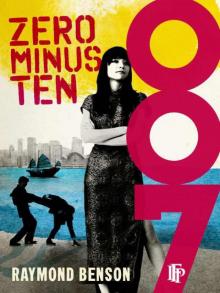 Zero Minus Ten
Zero Minus Ten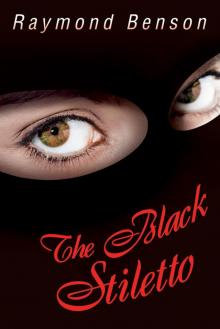 The Black Stiletto
The Black Stiletto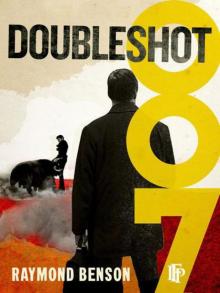 Doubleshot
Doubleshot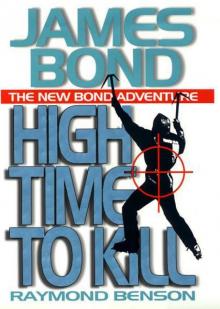 High Time To Kill rbb-3
High Time To Kill rbb-3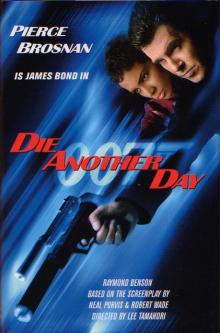 Bond Movies 07 - Die Another Day
Bond Movies 07 - Die Another Day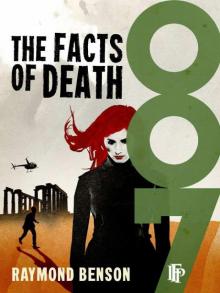 The Facts Of Death
The Facts Of Death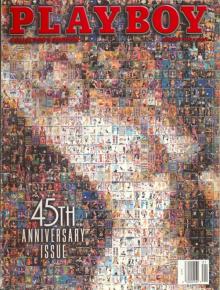 Midsummer Night's Doom
Midsummer Night's Doom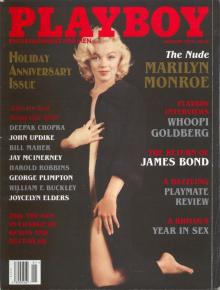 Blast from the Past
Blast from the Past The Secrets on Chicory Lane
The Secrets on Chicory Lane High Time To Kill
High Time To Kill The Black Stiletto: Black & White
The Black Stiletto: Black & White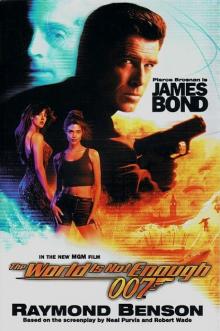 The World Is Not Enough jb-1
The World Is Not Enough jb-1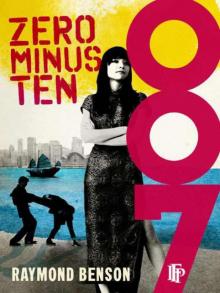 Zero Minus Ten rbb-1
Zero Minus Ten rbb-1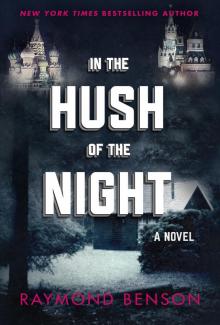 In the Hush of the Night
In the Hush of the Night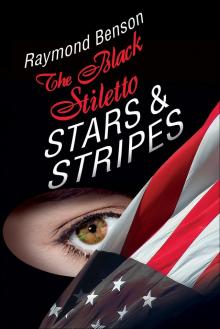 The Black Stiletto: Stars & Stripes
The Black Stiletto: Stars & Stripes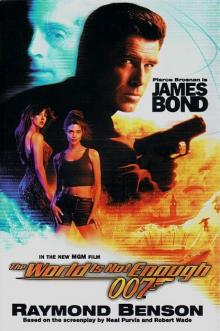 Bond Movies 06 - The World Is Not Enough
Bond Movies 06 - The World Is Not Enough The Rock 'n Roll Detective's Greatest Hits - A Spike Berenger Anthology
The Rock 'n Roll Detective's Greatest Hits - A Spike Berenger Anthology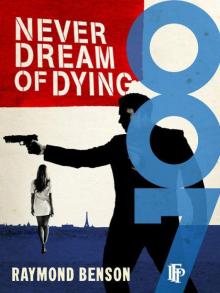 Never Dream Of Dying
Never Dream Of Dying